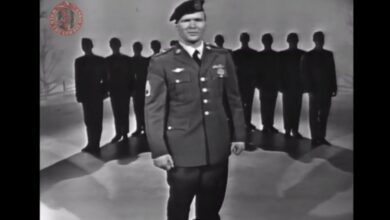Freddy penned this track in 1956, but it soared to fame in the 70s. Congrats, Freddy!
Freddy Fender, originally named Baldemar Garza Huerta, was born on June 4, 1937, in San Benito, Texas, and became one of the most significant figures in late 20th-century music. Growing up near the Texas-Mexico border, he was immersed in a variety of musical influences, including traditional Mexican tunes, country music, and rock and roll, which shaped his distinctive sound. His father, a laborer, taught him the importance of hard work, while his mother introduced him to the rich melodies of their heritage, laying the groundwork for his lifelong musical path.
Fender’s connection to music became evident early on. By the age of 10, he was performing professionally at local venues, showcasing his talent and enthusiasm. He often joined family members on musical outings, absorbing everything from the emotive strains of mariachi to the lively beats of country. During his high school years, he founded a band that played at local dances, refining his performance skills and stage presence. These formative experiences not only nurtured his musical gifts but also built the confidence that would support him throughout his career.
Fender’s path was not without obstacles. In the late 1950s, he encountered legal issues that resulted in a prison sentence for marijuana possession. This setback might have ended his dreams, but it instead became a pivotal moment. While incarcerated, he turned to music as a coping mechanism, helping him endure the harsh conditions. After his release, Fender returned to the music scene invigorated, ready to share his experiences through his songs.
The early 1970s marked a transformative period in the music industry, and Fender was prepared to seize the opportunity. His major breakthrough came in 1974 with the release of “Before the Next Teardrop Falls,” a song that reached the top of the country charts and earned him a Grammy Award. This hit highlighted his talent for expressing profound emotion, seamlessly blending country melodies with the Tejano sounds of his background. Its remarkable success revitalized his career and positioned him as a celebrated figure in music, known for his unique fusion of American and Mexican musical traditions.
Following this, his 1975 hit “Wasted Days and Wasted Nights” showcased his innovative musical style and widespread appeal. The re-release of this beloved classic, now refreshed with a new sound, dominated the Billboard Country chart and also made waves on the pop charts. The song’s emotional depth and rich instrumentation turned it into an anthem of love and nostalgia, reaching a diverse audience and solidifying his reputation as a poignant storyteller.
As his career flourished, Fender toured extensively across the U.S. and beyond, captivating audiences with his heartfelt performances. His music connected with fans from various backgrounds, celebrating both Mexican and American musical heritage. Renowned for his powerful voice and charismatic stage presence, Fender created an intimate bond with his audience, inviting them into the emotional heart of his songs.
Throughout his illustrious career, Fender’s influence transcended his own music. He became a crucial supporter of emerging talent in the Tejano genre, often serving as a mentor and collaborator. He played a key role in paving the way for prospective artists, demonstrating a commitment to preserving and evolving the rich musical traditions of his heritage. By collaborating with musicians from diverse genres, Fender forged a vibrant sound that resonated with many, inspiring generations of artists to embrace their cultural backgrounds and innovate within their craft.
Fender’s impact on music and culture was widely recognized. He was honored with multiple accolades, including induction into the Texas Country Music Hall of Fame in 2002, which highlighted the significance of his contributions to both country and Tejano music. His legacy has been celebrated through various documentary films and tributes that capture the essence of his journey and his influence on American music.
Freddy Fender passed away on October 14, 2006, but his music and legacy remain alive. Hits like “Wasted Days and Wasted Nights” and “Before the Next Teardrop Falls” continue to resonate, serving as enduring reminders of his artistry and storytelling ability. Each note reflects his journey from humble beginnings to global recognition, showcasing his resilience and passion. His life stands as a powerful testament to music’s capacity to overcome challenges and unite individuals from diverse backgrounds.
Fender’s life and work were closely linked to his cultural identity. He was a strong advocate for the representation of the Mexican-American community in the wider musical landscape, proudly embracing his heritage and weaving it into his music. He took his role seriously, striving to express the stories and experiences of his community through his art and connecting varied audiences. Ultimately, his trajectory represents not only personal successes but also a rich cultural narrative that continues to inspire and impact artists around the world.
The spirit of Freddy Fender endures as his harmonies are passed down to new generations of musicians. His songs resonate with universally relatable themes, ensuring that his legacy lives on in the hearts of fans and performers alike. The importance of his contributions serves as a powerful reminder of music’s ability to bridge cultural gaps and unite communities through shared experiences, celebrating the beauty of diversity in artistic expression.





